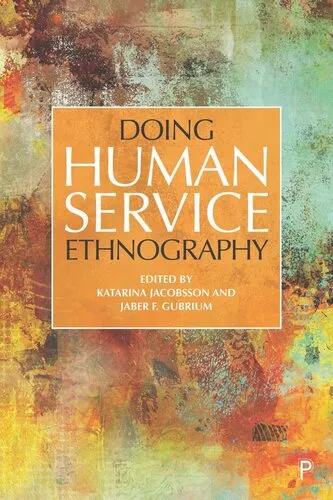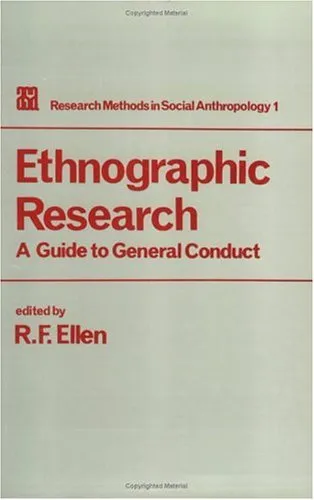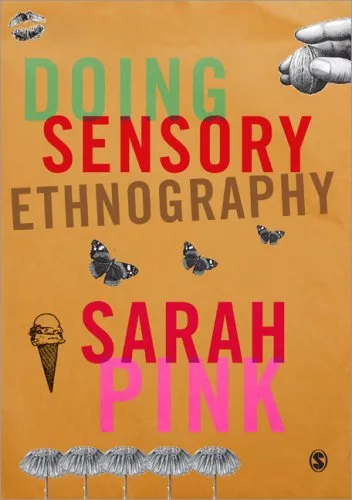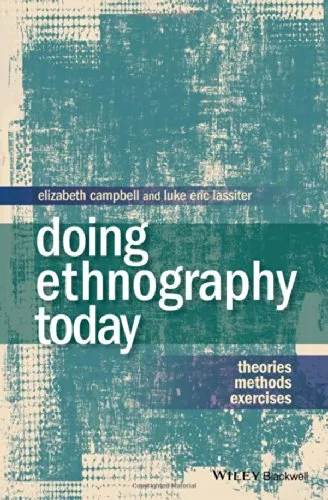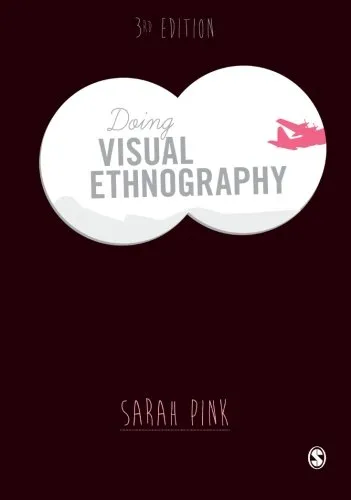Doing Human Service Ethnography
4.7
بر اساس نظر کاربران

شما میتونید سوالاتتون در باره کتاب رو از هوش مصنوعیش بعد از ورود بپرسید
هر دانلود یا پرسش از هوش مصنوعی 2 امتیاز لازم دارد، برای بدست آوردن امتیاز رایگان، به صفحه ی راهنمای امتیازات سر بزنید و یک سری کار ارزشمند انجام بدینکتاب های مرتبط:
معرفی کتاب
کتاب Doing Human Service Ethnography یک اثر تحلیلی و همهجانبه است که به روشهای تحقیقاتی منحصربهفردی پرداخته که ویژه حوزه خدمات انسانی (Human Services) طراحی شدهاند. این کتاب به ویراستاری کاترینا جاکوبسون و جبر گوبریوم نگارش و تدوین شده است و در راستای پرورش درکی عمیقتر از تحقیق ethnographic در زمینههای خدمات انسانی به خوانندگان کمک میکند. این اثر نگاهی بدیع به چالشها، پیچیدگیها و فرصتهای موجود در تحقیقات ethnographic در محیطهای خدمات انسانی دارد و ابزارهای کاربردی متنوعی را برای پژوهشگران فراهم میآورد.
خلاصهای از کتاب
Doing Human Service Ethnography به بررسی نحوه استفاده از روش ethnographic بهعنوان ابزاری برای تحقیق در محیطهای خدمات انسانی میپردازد. این کتاب ابتدا مفاهیم اصلی علوم انسانی و اجتماعی را در بستر روش ethnographic تعریف میکند و سپس این مفاهیم را در زمینههایی نظیر ارائه خدمات بهداشتی، اجتماعی، و آموزشی به کار میگیرد. در این مسیر، نویسندگان به مسائل اخلاقی، چالشیهای روششناختی، و پیچیدگیهای ارتباطی میپردازند که در محیطهای واقعی خدمات انسانی مطرح هستند.
یکی دیگر از ویژگیهای کلیدی این کتاب، بررسی رابطههای میان پژوهشگر، افراد حاضر در زمینه تحقیق، و نهادهای ارائهدهنده خدمات انسانی است. با مثالها و مطالعات موردی گوناگون، این اثر نهتنها روشهای تحقیقاتی را توضیح میدهد، بلکه نشان میدهد چگونه دادههای بهدستآمده را تحلیل کرده و بهصورت مفید ارائه کنیم.
نکات کلیدی
- تمرکز بر ارائه بینش کاربردی و عملی برای پژوهشهای ethnographic در زمینه خدمات انسانی.
- پرداختن به مسائل اخلاقی و ضرورت رعایت پروتکلهای اخلاقی در تحقیقات میدانی.
- شناسایی چالشهای فرهنگی، سازمانی، و میانفردی در زمینه خدمات انسانی و نحوه ثبت تجربیات میدانی.
- مثالهایی از پژوهشهای کاربردی که به تحلیل دقیق و تمرینهای عملی کمک میکنند.
جملات معروف از کتاب
"Human Service Ethnography is not just about describing what happens; it’s about understanding why it happens and how it shapes those involved."
"The success of ethnographic research in human services depends on the researcher's ability to listen, observe, and connect."
چرا این کتاب مهم است؟
در عصری که مدلهای خدمات انسانی بهطور مداوم در حال توسعه و تغییر هستند، کتاب Doing Human Service Ethnography بهعنوان ابزاری ضروری برای پژوهشگران، آکادمیسینها، و متخصصان خدمات انسانی عمل میکند. با تمرکز بر اهمیت کارهای میدانی و فراهم کردن چارچوبهای روششناختی موثر، این کتاب نقش بسزایی در فهم عمیقتر تعاملات اجتماعی و ارتباطات انسانی در محیطهای خدماتی ایفا میکند.
این اثر نهتنها به پژوهشگران کمک میکند تا دادههای معنادار و متنی غنی بهدست آورند، بلکه به مدیران و سیاستگذاران خدمات انسانی نیز کمک میکند تصمیمات بهتری براساس واقعیتهای موجود اتخاذ کنند. بنابراین، این کتاب برای هر کسی که در حوزههای علوم اجتماعی و خدمات انسانی فعالیت دارد، یک منبع بینظیر است.
Introduction to "Doing Human Service Ethnography"
"Doing Human Service Ethnography," edited by Katarina Jacobsson and Jaber Gubrium, is a seminal work that delves into the intricacies of ethnographic research within the human services field. Combining theoretical insights with practical guidance, this book serves as a valuable resource for academics, practitioners, and students alike who are looking to explore how ethnography can illuminate the complexities of human service systems, relationships, and lived experiences.
Focusing on the intersection of ethnography and human services, this book highlights how researchers can capture the nuanced interactions, tensions, and challenges that occur within complex institutional settings. Jacobsson and Gubrium take readers on an engaging journey into diverse methodologies, ethical considerations, and practical approaches, offering a comprehensive framework for conducting ethnographic research in settings such as healthcare, social work, education, and beyond.
Detailed Summary of the Book
"Doing Human Service Ethnography" explores the practical and theoretical aspects of ethnographic research within the human services sector.
The book is organized into a series of chapters written by leading scholars in the fields of ethnography and human service research. Each chapter focuses on a specific aspect of applying ethnographic methodology to real-world human service contexts. The contributors skillfully examine how qualitative research can address the complexities of human emotions, organizational dynamics, and structural challenges inherent in social service settings.
The text covers topics such as:
- The role of reflexivity in ethnographic research and its implications for human services.
- Ethical dilemmas and strategies in navigating sensitive or vulnerable settings.
- The use of ethnography as a tool for uncovering "invisible" practices and narratives in institutional frameworks.
- Critical perspectives on power dynamics, social structures, and institutional policies explored through ethnographic methods.
The overarching goal of the book is to equip readers with the tools and mindsets necessary to capture the richness of human service environments, offering new ways of understanding and improving them.
Key Takeaways
- Ethnography’s Value: Ethnographic research provides unparalleled insight into the lived experiences of service users and providers alike, challenging dominant narratives and shedding light on overlooked perspectives.
- Navigating Complexity: The book emphasizes the importance of understanding the intricate web of relationships and systemic structures that define human service environments.
- Ethics as a Cornerstone: Readers are encouraged to deeply consider and address ethical issues inherent in studying vulnerable populations and sensitive subjects.
- Reflexivity in Research: By reflecting on their own biases and positionality, ethnographers can produce richer, more thoughtful analyses of human service systems.
- Transformative Potential: Ethnography not only helps us better understand human service practices but also serves as a platform for advocating systemic change and improvement.
Famous Quotes from the Book
"Ethnography is not merely a method; it is a way of seeing, interpreting, and engaging with the world." – Katarina Jacobsson
"Human services are as much about the organizational structures that shape them as they are about the people they aim to serve." – Jaber Gubrium
"Capturing the informal, everyday practices of service delivery reveals the tacit knowledge that forms the backbone of professional care." – Contributing Author
Why This Book Matters
Human services are at the core of efforts to address pressing societal issues such as inequality, healthcare access, and social welfare. "Doing Human Service Ethnography" stands out as a crucial contribution by providing researchers and practitioners with a framework to critically engage with these issues.
At a time when evidence-based practice is heralded as the standard, the book demonstrates how ethnography complements quantitative approaches by delivering richly contextualized, human-centered insights. It bridges the gap between theory and practice, offering not just a methodological toolkit but also a lens through which to critically analyze and improve human service systems.
Furthermore, the book challenges readers to consider their own roles and responsibilities in shaping ethical and transformative research practices. Whether you are a seasoned ethnographer or new to qualitative research, this book equips you with both the theoretical grounding and the practical tools to embark on meaningful investigations in the human services sector.
دانلود رایگان مستقیم
شما میتونید سوالاتتون در باره کتاب رو از هوش مصنوعیش بعد از ورود بپرسید
دسترسی به کتابها از طریق پلتفرمهای قانونی و کتابخانههای عمومی نه تنها از حقوق نویسندگان و ناشران حمایت میکند، بلکه به پایداری فرهنگ کتابخوانی نیز کمک میرساند. پیش از دانلود، لحظهای به بررسی این گزینهها فکر کنید.
این کتاب رو در پلتفرم های دیگه ببینید
WorldCat به شما کمک میکنه تا کتاب ها رو در کتابخانه های سراسر دنیا پیدا کنید
امتیازها، نظرات تخصصی و صحبت ها درباره کتاب را در Goodreads ببینید
کتابهای کمیاب یا دست دوم را در AbeBooks پیدا کنید و بخرید
1262
بازدید4.7
امتیاز0
نظر98%
رضایتنظرات:
4.7
بر اساس 0 نظر کاربران
Questions & Answers
Ask questions about this book or help others by answering
No questions yet. Be the first to ask!
